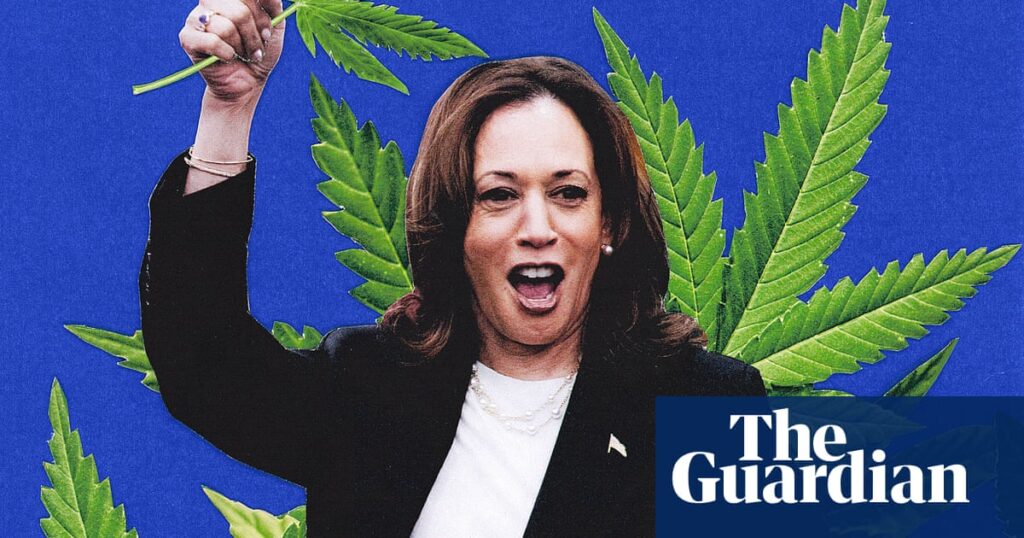Kamala Harris announced on Monday that if elected president, she would fully legalize recreational marijuana for adult use at the federal level. This is the first time a presidential candidate has taken such a clear position on repealing marijuana prohibition.
As part of her pledge, she said she would take steps to ensure that black men who have been unfairly imprisoned and disenfranchised by the drug war benefit from the industry.
Vince Sliwoski, a partner at the cannabis law firm Harris & Sliwoski, said he was “happy to see it because I like the message,” but added, “She didn’t just snap her fingers when she got to the office. It’s not enough just to do that,” he added. . That cannot be done by executive order. ”
Griffen Thorne, a fellow cannabis lawyer, felt the pledge was “obviously political” given that the announcement was made just three weeks before the election. According to a New York Times poll, Thorne and other experts interviewed by the Guardian suspect the Harris campaign is trying to boost its support among black voters, especially black men.
“Federal legalization of marijuana is sound policy, and supporting it is a smart strategy, not just for Black voters but for Americans as a whole,” said Drug Policy Action’s Director of Drug Markets and Regulation. said Kat Packer.
“As a Black woman and the first person of color to regulate marijuana for both medical and adult use, I understand the challenges in creating a legal marijuana market that works for Black men. “I also recognize the serious harm caused by the federal ban.”
Packer added that it makes sense for Harris’ plan to include provisions that remove barriers for black men in cannabis and other fields.
Notably, this pledge sets Harris apart from both her opponents and her predecessors. While Trump and Biden currently support some level of marijuana legalization, Harris is the first to say ending prohibition is a priority.
Biden made a number of promises regarding cannabis during his administration, including expunging criminal records for possession convictions and rescheduling cannabis to be eligible for FDA approval. The DEA is making progress toward rescheduling, but it will not be completed in time for the election.
And Biden only vacated a small number of marijuana-related convictions during his administration.
“It was kind of embarrassing because he kept posting everything he had promised on his website,” Sliwoski said.
Meanwhile, President Trump changed his stance on cannabis during this campaign, including supporting a future Florida ballot initiative that would legalize recreational marijuana. But decisions he made during his presidency left a lasting mistrust among his supporters.
“One of the first things Mr. Trump did was appoint drug war zealot Jeff Sessions as attorney general,” Sliwoski said, adding, “At least in the first few years of the Trump administration, the industry I was really nervous.”
Harris also distinguishes herself from Trump by calling for social equity provisions that would help black men benefit from the industry. However, making such provisions work is difficult. Even under the Biden administration, when Democrats controlled both chambers of Congress, they had difficulty passing cannabis policy reform, in part because of disagreements over whether social equity provisions went far enough, Thorne said. he pointed out.
“They’re making the perfect man the enemy of the good man,” Thorne said.
While some Republicans in Congress currently support cannabis reform, they are unlikely to vote in favor of a bill that includes many social equity provisions, Thorne added.
Sliwoski suggests looking at the More Act to see what provisions Harris might support if elected president.
Harris co-sponsored the bill when it was introduced in Congress in 2019. The bill would require the Bureau of Labor Statistics to track demographic information about cannabis business owners and employees and create a trust fund dedicated to efforts to support war-torn communities. About medicine.
Similar efforts have been attempted in state-level legislation, but they often fail. The state’s legal cannabis industry is still largely dominated by wealthy white men.
“Inequalities in the cannabis industry are due in part to banking regulations and high costs of market entry,” said Katherine Neal Harris, a drug policy researcher at Rice University. “Individuals need to have money or a wealthy investor at the beginning of the process, and white men tend to have more of both.”
Politico reports that social equity initiatives do not fully address barriers to entry into the industry, giving funding to people with questionable ties to the marginalized communities they were supposed to serve. It is said that there were times when
Reaction to Harris’ pledge has been mixed within the industry.
“I wouldn’t be shocked to hear another politician advocate for federal marijuana legalization in hopes of winning a few more votes in an election year. This isn’t the first time, but we hope it’s the last,” said Caleb Counts, CEO of Connected Cannabis. “This industry has suffered time and time again with too many broken promises.”
Meanwhile, Brian Garber, CEO of rolling paper company Hara Supply, found the news encouraging because Harris supported cannabis reform even before she ran for president.
“With Harris’ position clear, we expect her to sign a full-scale legalization bill and related bills, including expanding access to medical marijuana for veterans, addressing social justice, and industry banking reform.” “It looks like we can have it,” Garber said. “Of course, this is only possible if Congress is able to successfully get the bill to the president’s desk.”



